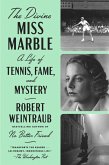From the Pulitzer Prize-winning journalist Madeleine Blais, the dramatic and colorful story of legendary tennis star and international celebrity, Alice Marble
In August 1939, Alice Marble graced the cover of Life magazine, photographed by the famed Alfred Eisenstaedt. She was a glamorous worldwide celebrity, having that year won singles, women's doubles, and mixed doubles tennis titles at both Wimbledon and the US Open, then an unprecedented feat. Yet today one of America's greatest female athletes and most charismatic characters is largely forgotten. Queen of the Court places her back on center stage.
Born in 1913, Marble grew up in San Francisco; her favorite sport, baseball. Given a tennis racket at age 13, she took to the sport immediately, rising to the top with a powerful, aggressive serve-and-volley style unseen in women's tennis. A champion at the height of her fame in the late 1930s, she also designed a clothing line in the off-season and sang as a performer in the Sert Room of the Waldorf Astoria Hotel in New York to rave reviews. World War II derailed her amateur tennis career, but her life off the court was, if anything, even more eventful. She wrote a series of short books about famous women. She turned professional and joined a pro tour during the War, entertaining and inspiring soldiers and civilians alike. Ever glamorous and connected, she had a part in the 1952 Tracy and Hepburn movie Pat and Mike, and she played tennis with the likes of Charlie Chaplin, Marlene Dietrich, and her great friends, Clark Gable and Carole Lombard. However, perhaps her greatest legacy lies in her successful efforts, working largely alone, to persuade the all-white US Lawn Tennis Association to change its policy and allow African American star Althea Gibson to compete for the US championship in 1950, thereby breaking tennis's color barrier.
In two memoirs, Marble also showed herself to be an at-times unreliable narrator of her own life, which Madeleine Blais navigates skillfully, especially Marble's dramatic claims of having been a spy during World War II. In Queen of the Court, the author of the bestselling In These Girls, Hope Is a Muscle recaptures a glittering life story.
Hinweis: Dieser Artikel kann nur an eine deutsche Lieferadresse ausgeliefert werden.
In August 1939, Alice Marble graced the cover of Life magazine, photographed by the famed Alfred Eisenstaedt. She was a glamorous worldwide celebrity, having that year won singles, women's doubles, and mixed doubles tennis titles at both Wimbledon and the US Open, then an unprecedented feat. Yet today one of America's greatest female athletes and most charismatic characters is largely forgotten. Queen of the Court places her back on center stage.
Born in 1913, Marble grew up in San Francisco; her favorite sport, baseball. Given a tennis racket at age 13, she took to the sport immediately, rising to the top with a powerful, aggressive serve-and-volley style unseen in women's tennis. A champion at the height of her fame in the late 1930s, she also designed a clothing line in the off-season and sang as a performer in the Sert Room of the Waldorf Astoria Hotel in New York to rave reviews. World War II derailed her amateur tennis career, but her life off the court was, if anything, even more eventful. She wrote a series of short books about famous women. She turned professional and joined a pro tour during the War, entertaining and inspiring soldiers and civilians alike. Ever glamorous and connected, she had a part in the 1952 Tracy and Hepburn movie Pat and Mike, and she played tennis with the likes of Charlie Chaplin, Marlene Dietrich, and her great friends, Clark Gable and Carole Lombard. However, perhaps her greatest legacy lies in her successful efforts, working largely alone, to persuade the all-white US Lawn Tennis Association to change its policy and allow African American star Althea Gibson to compete for the US championship in 1950, thereby breaking tennis's color barrier.
In two memoirs, Marble also showed herself to be an at-times unreliable narrator of her own life, which Madeleine Blais navigates skillfully, especially Marble's dramatic claims of having been a spy during World War II. In Queen of the Court, the author of the bestselling In These Girls, Hope Is a Muscle recaptures a glittering life story.
Dieser Download kann aus rechtlichen Gründen nur mit Rechnungsadresse in A, D ausgeliefert werden.
Hinweis: Dieser Artikel kann nur an eine deutsche Lieferadresse ausgeliefert werden.









